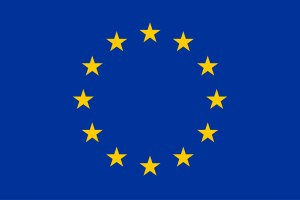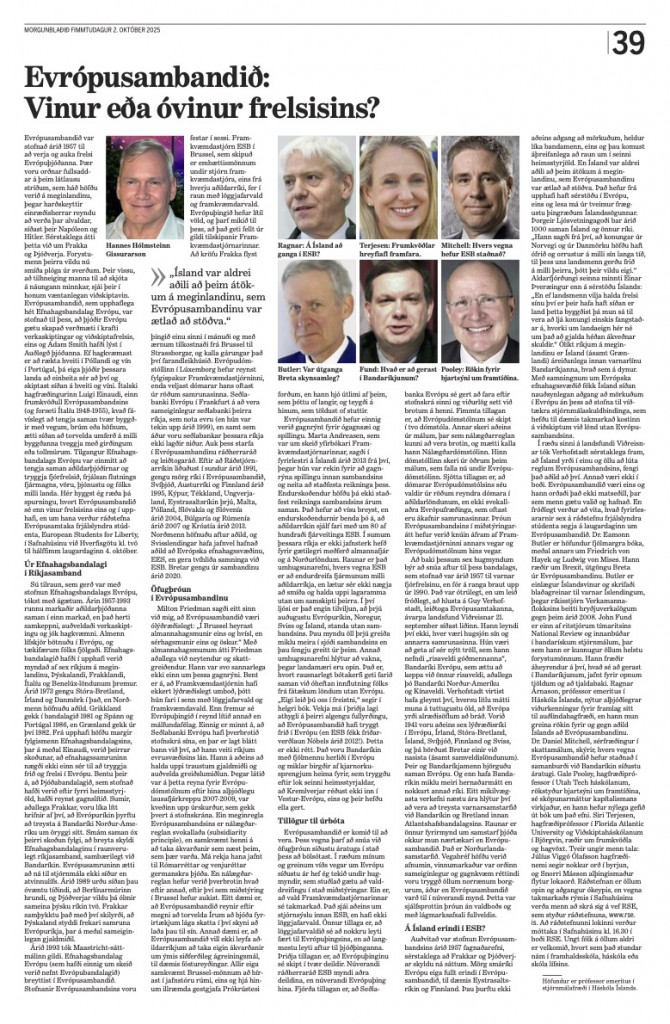 RNH Academic Director Hannes H. Gissurarson published an article in Morgunbladid on 2 October 2025, promoting a conference to be held on 4 October by Students of Liberty Europe and RSE, the Icelandic Research Centre for Social and Economic Affairs, on ‘The European Union: Friend or Foe of Liberty’. He said that initially the EU was a force for economic freedom in Europe, facilitating the free movement of capital, goods, services, and people across borders, the celebrated four freedoms. This was quite successful. Economic integration, benefitting everybody, had been more or less accomplished in the early 1990s. But in the 1990s, forces that wanted political integration, centralisation, even a European superpower, took over. After the 1989 collapse of the Berlin Wall, France only supported German reunification if Germany would support further centralisation, and the euro.
RNH Academic Director Hannes H. Gissurarson published an article in Morgunbladid on 2 October 2025, promoting a conference to be held on 4 October by Students of Liberty Europe and RSE, the Icelandic Research Centre for Social and Economic Affairs, on ‘The European Union: Friend or Foe of Liberty’. He said that initially the EU was a force for economic freedom in Europe, facilitating the free movement of capital, goods, services, and people across borders, the celebrated four freedoms. This was quite successful. Economic integration, benefitting everybody, had been more or less accomplished in the early 1990s. But in the 1990s, forces that wanted political integration, centralisation, even a European superpower, took over. After the 1989 collapse of the Berlin Wall, France only supported German reunification if Germany would support further centralisation, and the euro.
Gissurarson then discussed the lack of democracy and transparancy in the present EU institutions, especially in the EU Commission, and in the Court of Justice of the EU. He suggested that the EU should be reformed and the Subsidiarity Principle should be reinstated as its guiding principle. He outlined six ideas to reform the EU: 1) the Commission should be turned into an ordinary civil service, 2) legislative power should be partly returned to national parliaments and partly transferred to the European Parliament, 3) the European Parliament should be split into two chambers, one the present European Council, the other one the present Parliament, 4) penalities should be applied to the governors of the European Central Bank if they break the rules in its Charter (as they have blatantly done), 5) the Court of Justice of the EU should be split into two, a Subsidiarity Court only about whether that principle was broken, and another Court, dealing with other issues, and 6) judges should not be selected from a pool of euroenthusiasts, but from the ranks of experienced judges.
Gissurarson observed that Iceland, a remote island in the north, was never a part of the continental project, the decision by the French and the Germans to stop their endless wars. He recalled the history of the Icelandic Commonwealth, where chieftains and farmers had emphasised Icelandic exceptionalism. It was no coincidence, Gissurarson added, that the three richest countries in Europe, Switzerland, Norway, and Iceland, were all outside the EU. He also discussed a remarkable speech given by euroenthusiast Guy Verhofstadt in Iceland on 21 September where he said, quite firmly, 1) that the EU should become a superpower competing with the US and China, and 2) that the member states had to be all in or all out, as the EU was not a menu from which you could choose what you wanted, as the British had imagined.
Gissurarson then briefly introduced the speakers at the forthcoming conference, commenting that perhaps they could help the audience to understand some important issues: Dr. Eamonn Butler on Brexit; John Fund on American politics; Professor Ragnar Árnason on arguments for and against Iceland joining the EU; Dr. Daniel Mitchell on the stagnation in the EU compared to the US; Professor Siri Terjesen on the hope that creativity and entrepreneurship provide for young people; and Professor Gale Pooley on the remarkable findings of his new book on Superabundance.



